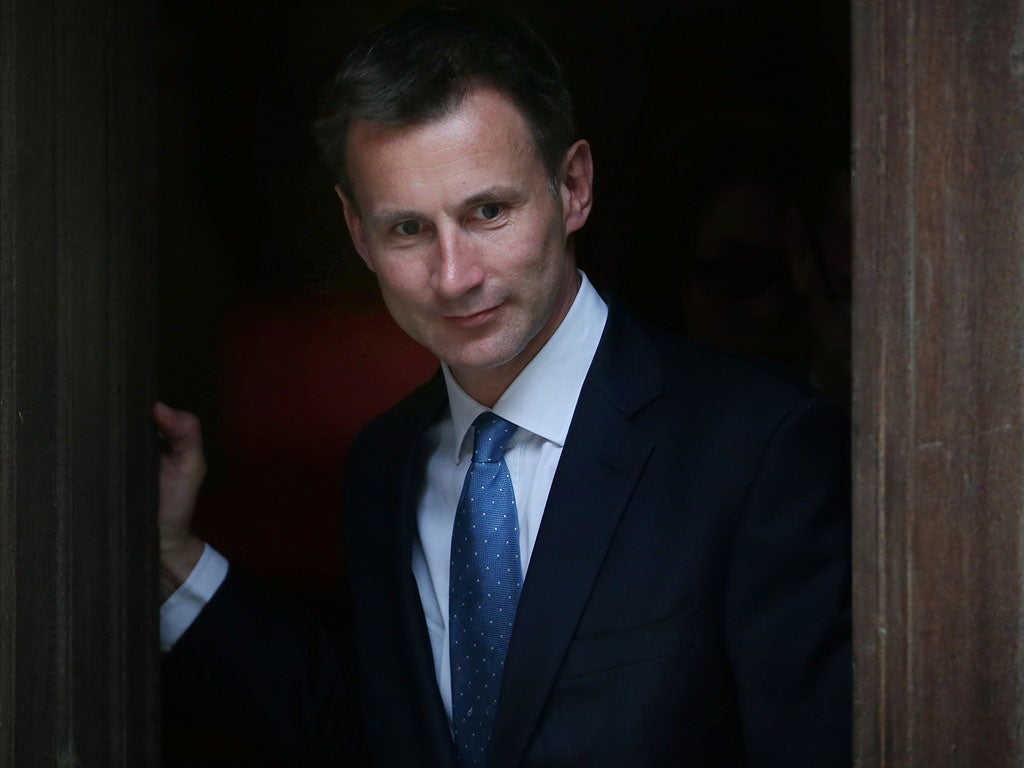Hunt faces new questions over BSkyB bid
The former culture secretary may yet have to answer to standards tsar

Your support helps us to tell the story
From reproductive rights to climate change to Big Tech, The Independent is on the ground when the story is developing. Whether it's investigating the financials of Elon Musk's pro-Trump PAC or producing our latest documentary, 'The A Word', which shines a light on the American women fighting for reproductive rights, we know how important it is to parse out the facts from the messaging.
At such a critical moment in US history, we need reporters on the ground. Your donation allows us to keep sending journalists to speak to both sides of the story.
The Independent is trusted by Americans across the entire political spectrum. And unlike many other quality news outlets, we choose not to lock Americans out of our reporting and analysis with paywalls. We believe quality journalism should be available to everyone, paid for by those who can afford it.
Your support makes all the difference.David Cameron was under fresh pressure to refer Jeremy Hunt to the standards adviser last night over whether his Health Secretary breached the ministerial code.
Ruling on Mr Hunt, who was Culture Secretary until September, Lord Justice Leveson said he had seen no "credible evidence of actual bias" in his handling of Rupert Murdoch's BSkyB takeover attempt.
The Prime Minister, in his Commons statement on the report on Thursday, called on Labour to apologise to Mr Hunt after saying he had been cleared by the judge.
Yet the report makes clear that Mr Hunt was responsible for the actions of his special adviser, Adam Smith, who acted as a back channel for the News Corporation lobbyist Fréd Michel during the negotiations. Under section 3.3 of the ministerial code, ministers are accountable for special advisers, yet, while Mr Smith resigned over his actions, Mr Hunt was promoted in the reshuffle.
Suspected breaches of the ministerial code would normally be referred to Sir Alex Allan, the Prime Minister's adviser.
Section 3.3 of the code says: "The responsibility for the management and conduct of special advisers, including discipline, rests with the Minister who made the appointment. Individual Ministers will be accountable to the Prime Minister, Parliament and the public for their actions and decisions in respect of their special advisers."
In his report, Lord Justice Leveson said the causes of Mr Smith's behaviour "are all matters for which Mr Hunt was responsible". He said there was a "serious hidden problem" in the contact between Mr Smith and Mr Michel. While concluding that Mr Hunt acted "commendably" in his handling of the bid, he said that it did run "the risk of a successful claim for judicial review".
Lord Justice Leveson made clear that it was not his job to judge whether the ministerial code had been broken, despite Mr Cameron's insistence, at the height of the affair last spring, that he did not want to refer the matter to Sir Alex because there was a judge looking into it.
The report also said that Mr Hunt's memo of 19 November 2010 to the Prime Minister, was "emphatic … support for the bid in private" which "increased the quantity (and quality) of what he had said and written on the subject".
Yet Mr Hunt told the Commons on 25 April this year that he "made absolutely no interventions" seeking to influence the BSkyB decision. Misleading Parliament is also a breach of the ministerial code.
Lord Justice Leveson also said that Mr Michel had possessed "an... indication... of what was to happen the following day when Mr Hunt announced that he was minded to refer the bid [to the Competition Commission] but was going to take advice on News Corp's undertaking in lieu".
A spokesman for Mr Hunt said last night: "There has been a thorough investigation into Jeremy's conduct, and it was found that he handled the bid without bias."
the leveson conundrum The key figures
Join our commenting forum
Join thought-provoking conversations, follow other Independent readers and see their replies
Comments